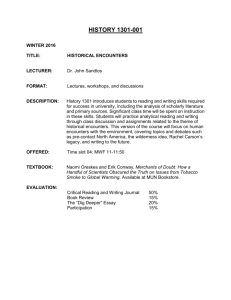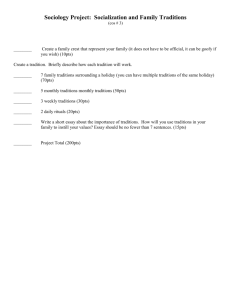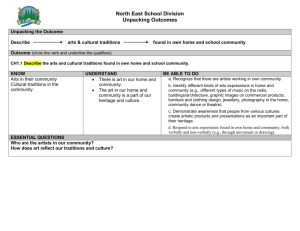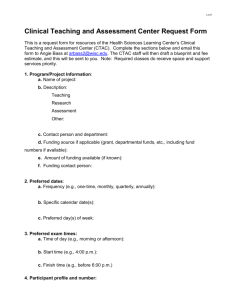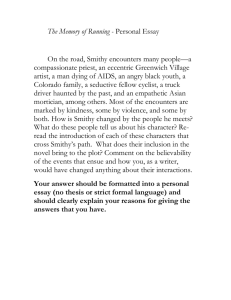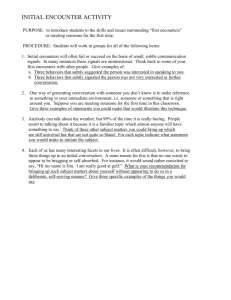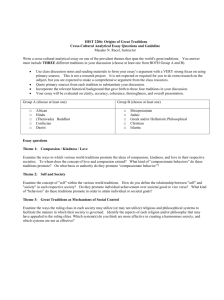HTY 115.002, World Historcy to 1500, Defelice,
advertisement
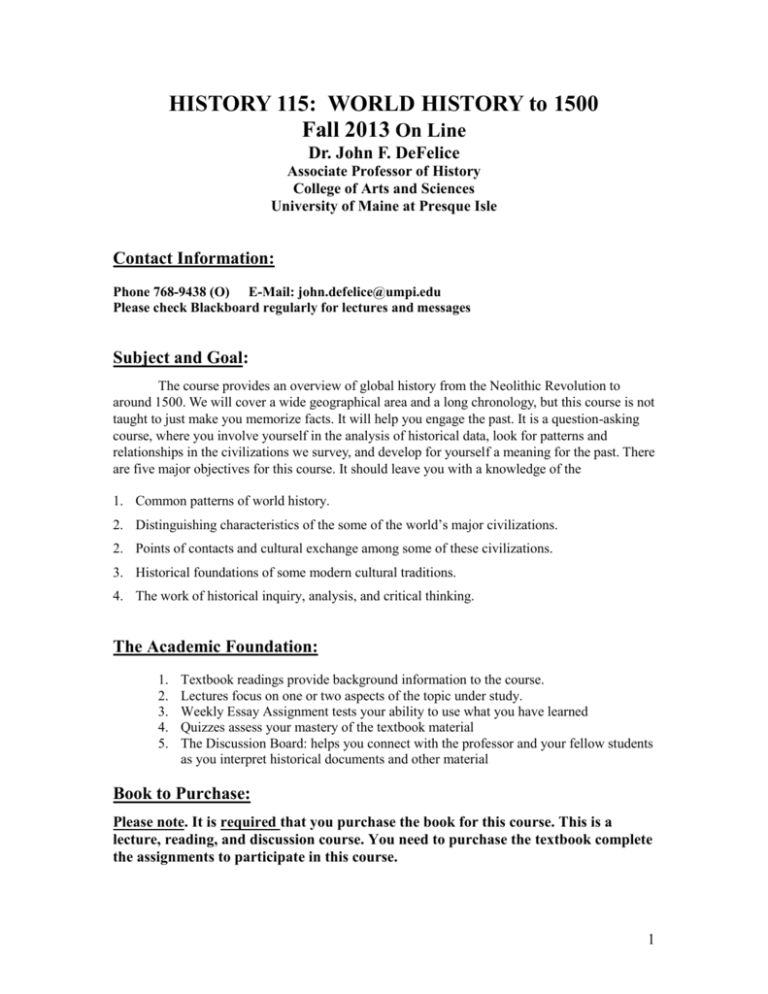
HISTORY 115: WORLD HISTORY to 1500 Fall 2013 On Line Dr. John F. DeFelice Associate Professor of History College of Arts and Sciences University of Maine at Presque Isle Contact Information: Phone 768-9438 (O) E-Mail: john.defelice@umpi.edu Please check Blackboard regularly for lectures and messages Subject and Goal: The course provides an overview of global history from the Neolithic Revolution to around 1500. We will cover a wide geographical area and a long chronology, but this course is not taught to just make you memorize facts. It will help you engage the past. It is a question-asking course, where you involve yourself in the analysis of historical data, look for patterns and relationships in the civilizations we survey, and develop for yourself a meaning for the past. There are five major objectives for this course. It should leave you with a knowledge of the 1. Common patterns of world history. 2. Distinguishing characteristics of the some of the world’s major civilizations. 2. Points of contacts and cultural exchange among some of these civilizations. 3. Historical foundations of some modern cultural traditions. 4. The work of historical inquiry, analysis, and critical thinking. The Academic Foundation: 1. 2. 3. 4. 5. Textbook readings provide background information to the course. Lectures focus on one or two aspects of the topic under study. Weekly Essay Assignment tests your ability to use what you have learned Quizzes assess your mastery of the textbook material The Discussion Board: helps you connect with the professor and your fellow students as you interpret historical documents and other material Book to Purchase: Please note. It is required that you purchase the book for this course. This is a lecture, reading, and discussion course. You need to purchase the textbook complete the assignments to participate in this course. 1 Bentley, Ziegler, and Streets-Salter, Traditions and Encounters: A Brief Global History. Vol. 1 3rd Ed. McGraw Hill, 2014. ISBN 9780077412050 Course Requirements Lectures and Chapter Readings I have assigned one or two chapters from Traditions and Encounter Brief Edition in each module. Each chapter has a lecture on PowerPoint loaded onto Blackboard for you to view to under “Course Documents" I suggest you read each chapter before you view the PowerPoint slides. Please Note: In previous versions of this course I also used to have video lectures. But after interviewing students in several classes, I found that they were rarely used. Students felt that they took online courses to avoid lecture formats and that lectures took too much time. This new format I am using follows models of many successful online courses. As a result, this fall there are no video lectures. The Discussion Board The heart of any online course is the discussion board. This is where we interact with each other, share our comments and explore the building blocks of historical investigation. We do that by answering questions about primary sources. Primary sources are those which are written by contemporary witnesses of historical events or participants in historical events. They are the raw materials of history. Secondary sources are the result of historical investigations using a collection of primary sources. An example is your textbook. Another would be a historical book or monograph that focuses on a more specialized topic, such as Shirer's famous The Rise and Fall of the Third Reich or the even more specialized book, Browning's Ordinary Men: Reserve Police Battalion 101and the Final solution. So what do you do with the Discussion Board? There are two tasks! Both earn participation points Post an answer: to a question on one of our assigned sources. There are one or two each week. Provide a 30-40 word original answer to each question. This earns you up to 20 participation points per original post. Post a response: to another student's answer. Add to their answer, show another side of the issue, maybe you can even provide a comment and a web link to an interesting source. Choose ONE or TWO of our weekly primary source readings. You can respond to the response as well and have a conversation. For responses, you can earn up to 10 points per response. You can respond to my comments as well. 2 Grade value: How many participation points do you need? For this course, to earn An "A" for the participation you need a minimum of 450 participation points. That easily translates to one or two original posts of your own and few responses each week. Extra Credit: How do you earn extra credit? Post most! As your grade rises above 350 points, extra credit rises as well. This can make up for some missed quizzes or quizzes with low scores. Timing is everything! You must post each week between Monday and Sunday on each module! After 10:00 PM Sunday (unless otherwise indicated) the message board is permanently closed. Then you have to move to the material for the next module. On Line Quizzes: While there is no final or midterm exam, there is an essay quiz for each chapter. Where Are the Quizzes? Good question! Go to our course on Blackboard. Click on "Essay Quizzes" You'll find the quizzes arranged according to chapter. You’ll find instructions and an example. Essay Quiz: Each chapter has question that covers some of the chapter material as well. You provide an answer and submit it via Blackboard. This is not an essay! It's a short answer of around 150 words to make sure you understand one of the key concepts of each chapter. Each essay quiz is worth up to 10 points (for a possible total of 180 points). It must be submitted before the due date (Sunday 10:00 PM of each week. After that the quiz is automatically closed and you will earn a “0”. GRADE VALUES Essay Quizzes (180 points) 60% Discussion Board (Participation) (450 points) 40% Total 100% Learning Objectives 5a. Students will understand and appreciate the diversity and interrelationship of cultures locally, regionally, nationally, and internationally. 5c. Students will demonstrate linguistic skills and cultural knowledge. 3 CLASS SCHEDULE MODULE 01 Sept 03-Sept 08 Reading and Lecture Assignment: Traditions and Encounters Chapter One: The Foundations of Complex Societies PowerPoint Lecture Chapter One Essay Quiz (due Sunday Sept 08 10:00 PM) Discussion Board Question: Module One All page numbers are from Traditions and Encounters Read "The Flood Story from Gilgamesh" (p. 17) Discussion Question: Discuss the similarities and differences between this flood story and the story of Noah's flood in the Hebrew Bible. This is in Genesis chapters 69. Explain possible reasons why these two accounts are similar. MODULE 02 Sept 9-Sept 15 Reading and Lecture Assignment: Traditions and Encounters Chapter Two: Early African Societies and the Bantu Migrations PowerPoint Lecture Chapter Two Essay Quiz (due Sunday Sept 15 10:00 PM) Discussion Board Question: Module Two All page numbers are from Traditions and Encounters Read "Harkhuf's Expedition to Nubia" (p. 32) Discussion Question: How does this reading show Egyptian interest in Nubia? How did they gain knowledge of their southern neighbor? And what exactly are pygmies and where do they come from in Africa 4 MODULE 03 Sept 16-Sept 22 Reading and Lecture Assignment: Traditions and Encounters Chapter Three: Early Societies in South and East Asia Chapter Four: Early Societies in the Americas and Oceania PowerPoint Lectures Chapters Three and Four Essay Quizzes (due Sunday Sept 22 10:00 PM) Discussion Board Question: Module Three All page numbers are from Traditions and Encounters Read "The Rig Veda on the Origin of the Castes" (p. 51) Discussion Question: How does the division of the four varnas [brahmin (priest), kshatriya (warrior), vaishya (merchant), and shudra (cultivator)] from Purushra reflect their relative functions is society? Read "The Popol Vuh" on the Creation of Human Beings" (p. 70) Discussion Question: Discuss the extent to which this account of human creation reflects the influence on Mayan society of both agriculture and the untamed natural world. Do some research: Why is the jaguar so prominent in Mesoamerican religion? MODULE 04 Sept 23-Sept 29 Reading and Lecture Assignment: Traditions and Encounters Chapter Five: The Empires of Persia PowerPoint Lecture Chapter Five Essay Quiz (due Sunday Sept 29 10:00 PM) Discussion Board Question: Module Four All page numbers are from Traditions and Encounters Read "Zarathustra on Good and Evil" (p. 95) Discussion Question: What assumptions does Zarathustra make about human nature and the capacity of human beings to make morally good choices out of their own free will? 5 Look up how souls are judged on the Chinvat Bridge after death. How does it compare to Christianity and its judgment? MODULE 05 Sept 30-Oct 06 Reading and Lecture Assignment: Traditions and Encounters Chapter Six: The Unification of China PowerPoint Lecture Chapter Six Essay Quiz (due Sunday Oct 06 10:00 PM) Discussion Board Question: Module Five All page numbers are from Traditions and Encounters Read "Confucius on Good Government" (p. 102) Discussion: Compare Confucius understanding of moral virtue to that of Zarathustra's concept of morality (pp. 93-94 and 100-102 for more information) MODULE 06 Oct 07-Oct 13 Reading and Lecture Assignment: Traditions and Encounters Chapter Seven: State, Society, and the Quest for Salvation in India PowerPoint Lectures Chapters Seven Essay Quiz (due Sunday Oct 13 10:00 PM) Discussion Board Question: Module Six All page numbers are from Traditions and Encounters Read "The Teachings of the Buddha" (p. 129) Discussion: Consider the teachings of the Buddha in comparison to popular Hinduism as it was expressed in the Bagavad Gita (see pp 128-130). How did the lessons of the Buddha differ from those of the Bagavad Gita, especially regarding the advisability of involving oneself on the affairs of day to day life? MODULE 07 Oct 14-Oct 20 6 Reading and Lecture Assignment: Traditions and Encounters Chapter Eight: Mediterranean Society under the Greeks and Romans Chapter Nine: Cross-Cultural Exchanges on the Silk Roads PowerPoint Lecture Chapters Eight and Nine Essay Quizzes (due Sunday Oct 20 10:00 PM) Discussion Board Question: Module Seven All page numbers are from Traditions and Encounters Read "Arrian on the Character of Alexander of Macedon" (p. 141) Discussion: On the basis of Arrian’s characterization, do you think Alexander had strong potential to become an effective governor as well as a talented conqueror? AND Read "St. Cyprian on Epidemic Disease in the Roman Empire" (p. 165) Discussion: To what extent do you think St. Cyprian was effective in his efforts to bring inherited Christian teachings to bear on the unprecedented conditions he and his followers faced? MODULE 08 Oct 21-Oct 27 Reading and Lecture Assignment: Traditions and Encounters Chapter Ten: The Christian Commonwealth of Byzantium PowerPoint Lecture Chapter Ten Essay Quiz (due Sunday Oct 27 10:00 PM) Discussion Board Question: Module Eight All page numbers are from Traditions and Encounters Read "The Wealth and Commerce of Constantinople" (p. 187) Discussion: How is it possible to account for the prosperity that Benjamin of Tudela found in Constantinople? 7 MODULE 09 Oct 28-Nov 3 Reading and Lecture Assignment: Traditions and Encounters Chapter Eleven: The Expansive Role of Islam PowerPoint Lecture Chapter Eleven Essay Quiz (due Sunday Nov 3 10:00 PM) Discussion Board Question: Module Nine All page numbers are from Traditions and Encounters Read "The Quran on Allah and his Expectations of Human Kind" (p. 201) Discussion: Compare the Quran's teachings on the relationship between Allah and human beings with the views of Zoroastrians, Jews, and Christians discussed in earlier chapters. How do you find this material? Use the index of your textbook! MODULE 10 Nov 04-Nov 10 Reading and Lecture Assignment: Traditions and Encounters Chapter Twelve: The Resurgence of Empire in East Asia PowerPoint Lecture Chapter Twelve Essay Quiz (due Sunday Nov 10 10:00 PM) Discussion Board Question: Module Ten All page numbers are from Traditions and Encounters Read "The Arab Merchant Suleiman on Business Practices in Tang China" (p. 224) Discussion: In what ways might Chinese policies have encouraged business and trade during the Tang dynasty? MODULE 11 Nov 11-Nov 17 Reading and Lecture Assignment: Traditions and Encounters 8 Chapter Thirteen: Indian and the Indian Ocean Basin Chapter Fourteen: Nomadic Empires and Eurasian Integration PowerPoint Lecture Chapters Thirteen and Fourteen Essay Quizzes (due Sunday Nov 17 10:00 PM) Discussion Board Question: Module Eleven All page numbers are from Traditions and Encounters Read "Cosmos Indicopleustes on Trade in Southern India" (p. 240) Discussion: Find Ceylon on the map on p. 251. Why did Ceylon become such an important location for Indian Ocean trade? Even if Ceylon produced few goods (and they did), how could they profit? AND Read "Marco Polo on Mongol Military Tactics" (p. 260) Discussion: In what ways do the military practices described by Marco Polo reflect the influence of the steppe environment on the Mongols? What is a "steppe environment"? Do some research. How would the Mongols later adapt to different terrain and walled cities? MODULE 12 Nov 18-Nov 24 Reading and Lecture Assignment: Traditions and Encounters Chapter Fifteen: States and Societies of Sub-Saharan Africa PowerPoint Lecture Chapter Fifteen Essay Quiz (due Sunday Nov 24 10:00 PM) Discussion Board Question: Module Twelve All page numbers are from Traditions and Encounters Read "Ibn Battuta on Muslim Society at Mogadishu" (p. 283) Discussion: From Ibn Battuta's report, how could you characterize the role of hospitality on the Swahili coast? Can you think of reasons why Ibn Battuta perhaps rated special treatment? 9 MODULE 13 Nov 25-Dec 01 Reading and Lecture Assignment: Traditions and Encounters Chapter Sixteen: Christian Western Europe during the Middle Ages PowerPoint Lecture Chapter Sixteen Essay Quiz (due Sunday Dec 01 10:00 PM) Discussion Board Question: Module Thirteen All page numbers are from Traditions and Encounters Read "Francesco Balducci Pegolotti on Trade between Europe and China" (p. 294) Discussion: On the basis of Pegolotti’s report, how could you characterize the various commercial, financial, and economic risks faced by European merchants traveling to China and trading there? MODULE 14 Dec 02- Dec 08 Reading and Lecture Assignment: Chapter Seventeen: Worlds Apart: The Americas and Oceania Traditions and Encounters PowerPoint Lecture Chapter Seventeen Essay Quiz (due Sunday Dec 08 10:00 PM) Discussion Board Question: Module Fourteen All page numbers are from Traditions and Encounters Read "Mo'ikeha's Migration from Tahiti to Hawai`i" (p. 321) Discussion: How would you characterize the political, social, and cultural significance of two-way voyaging between Tahiti and Hawai`i? MODULE 15 Dec 09-Dec 15 Reading and Lecture Assignment: 10 Traditions and Encounters Chapter Eighteen: Reaching Out: Cross Cultural Interactions PowerPoint Lecture Chapter Eighteen Essay Quiz (due Sunday Dec 15 10:00 PM) Discussion Board Question: Module Fifteen All page numbers are from Traditions and Encounters Read "John of Montecorvino on his mission to China" (p. 330) Discussion: How did John of Montecorvino seem to regard the khan and his Chinese subjects? What were his primary methods of trying to convert the people of Khanbaliq? Does his tone sound hopeful about the eventual success of his Christian mission in China? Why or why not? Statement of Commitment As a member of the university, I pledge to Pursue academic excellence, Support open inquiry and civil expression, Listen respectfully to the viewpoints of others, Participate responsibly in the life of the community, Conserve and enhance the beauty of the campus, and Help members of the university realize their potential. 11
